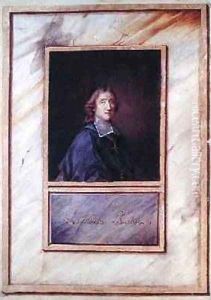Francois de Salignac de la Mothe-Fenelon Paintings
François de Salignac de la Mothe-Fénelon, more commonly known as François Fénelon, was a French archbishop, theologian, poet and writer, known for his views on religion and politics during the reign of Louis XIV. Born on August 6, 1651, in the Château de Fénelon in Sainte-Mondane, he came from an old noble family of the Périgord region. He was educated at the seminary of Saint-Sulpice in Paris, where he was ordained as a priest in 1675.
Initially serving as a missionary to the Huguenots, Fénelon quickly gained a reputation for his eloquent preaching and his compassionate approach to the religious controversies of the time. In 1689, he was appointed as the tutor to the grandson of Louis XIV, the Duke of Burgundy, who was second in line to the throne. His influence on the young duke was profound, and he wrote his most famous work, 'Les Aventures de Télémaque', as an educational novel for his pupil. The book, which is a didactic work disguised as a Greek epic, emphasizes moral and political lessons and promotes the ideals of a wise and benevolent ruler, indirectly criticizing the autocratic rule of Louis XIV. This led to Fénelon's political fall from favor, especially after the book was published to wide acclaim in 1699 without his consent.
As a theologian, Fénelon is best known for his involvement in the Quietist controversy. He defended the mystic Madame Guyon, a proponent of Quietism, which advocated complete passivity and the internal pursuit of God. This defense led to a strained relationship with Bossuet, one of the most influential figures in the French Church, who attacked the Quietist views as heretical. Although Fénelon submitted to the authority of the Pope when his own writings on the subject were condemned, his spiritual views continued to influence many.
Despite his fall from political grace, Fénelon was appointed Archbishop of Cambrai in 1695, where he proved to be a dedicated and reforming pastor until his death on January 7, 1715. His pastoral letters and other writings, including a series of essays on the education of girls and his correspondence, are notable for their advocacy of a more personal, compassionate, and less formal approach to religion. Fénelon remains an important figure in the history of French literature and Catholic theology, respected for his intellect, oratory skills, and his commitment to the principles of Christian love and charity.
